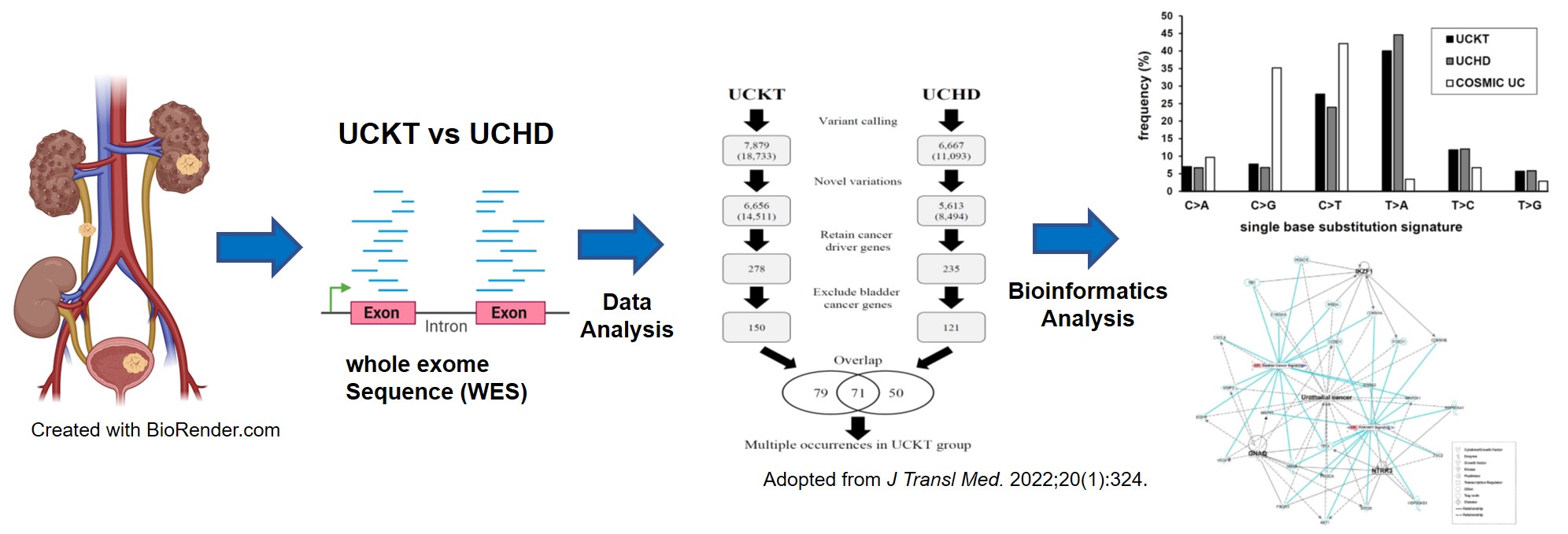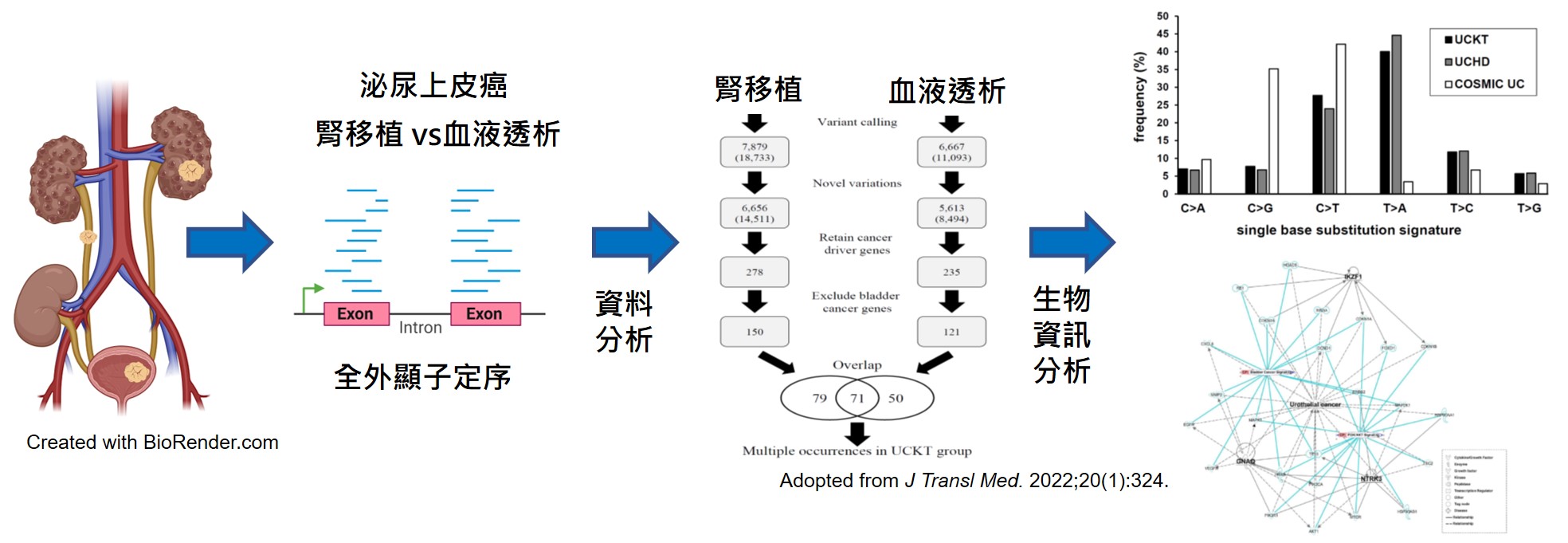Whole-Exome Sequencing Identified Mutational Profiles of Urothelial Carcinoma post Kidney Transplantation
Whole-Exome Sequencing Identified Mutational Profiles of Urothelial Carcinoma post Kidney Transplantation
Kidney transplantation is a lifesaving option for patients with end-stage kidney disease. Due to long term immunosuppressive agent prescription after kidney transplantation, kidney transplant recipients have higher risk of developing post-transplant malignancy. In Taiwan, urothelial carcinoma (UC) is the most common de novo cancer after kidney transplantation (KT). According to our study, UC is the most common malignancy post KT in our hospital, with female predominant. Typically, skin cancer is the most common malignancy encountered after kidney transplantation in Western countries. Meanwhile, men in their middle ages with smoking history are at higher risk of developing UC in general population. These unique features of post-transplant UC in Taiwan raised our curiosity in exploring their molecular characteristics. To explore the molecular characteristics in post-KT UC, we performed whole-exome sequencing to compare the genetic alterations in UC developed after kidney transplantation (UCKT) and UC in patients on hemodialysis (UCHD). Twelve tumor samples (7 from UCKT and 5 from UCHD) were collected. Our preliminary findings showed that missense mutation is the most common nucleotide change from the single-base substitution (SBS) profile and the signatures showed a relative high T > A pattern compared to COMSIC UC mutations database. Based on the analysis from databases, literature reviews, and bioinformatics studies, a total of 14 UCKT-specific genes with SNPs identified in more than two patients were included in further analyses. Ingenuity pathway analysis was used to explore the connections among these genes with UC. GNAQ, IKZF1, and NTRK3 were novel genes identified as potentially involved in the signaling network of UC. Currently, NTRK3 will be our main focus to investigate its role in the pathogenesis of UC and clinical application, and further evaluate its role in UCKT. The genetic analysis of post-transplant malignancies may elucidate a fundamental aspect of the molecular pathogenesis of UCKT.

Application and Highlights:
1.This is the first study on analyzing the mutational profiles of urothelial carcinoma post kidney transplantation.
2.This study identified 3 UCKT-specific genes with SNPs (GNAQ, IKZF1 and NTRK3).
3.Using the modern technologies of molecular biology, this study explores the differences and prognostic factors of urothelial carcinoma
post kidney transplant patients and dialysis populations in Taiwan. This study provides valuable novel knowledge for better understanding
the occurrence of post-transplant malignancy in Taiwan and provides possible clinical diagnosis and treatment strategies.
Research Team Members:
Dr. Lee-Moay Lim https://www.kmuh.org.tw/KMUHInterWeb/InterWeb/InnerPage/1001124056
Dr. Wen-Yu Chung http://203.64.95.220/wordpress/
Dr. Daw-Yang Hwang https://nicr.nhri.org.tw/pi/hwangdy-cv/
Dr. Hung-Lung Ke https://www.kmuh.org.tw/KMUHInterWeb/InterWeb/InnerPage/1001124056
Dr. A-Mei Huang http://amhuang.dlearn.kmu.edu.tw/
Dr. Hung-Tien Kuo https://www.kmuh.org.tw/KMUHInterWeb/InterWeb/InnerPage/1001124056
Representative Department:
Division of Nephrology, Department of Internal Medicine, KMUH
Department of Urology, KMUH
Graduate Institute of Clinical Medicine, College of Medicine, KMU
Department of Biochemistry, College of Medicine, KMU
Introduction of Research Team:
Urothelial carcinoma is the most common cancer after kidney transplantation in Taiwan. This research was a cooperative work of researchers from Division of Nephrology, Department of Urology, Graduate Institute of Clinical Medicine, Department of Biochemistry in KMU and National Kaohsiung University of Science and Technology. We aimed to exploring the pathogenesis and etiology of urothelial carcinoma after kidney transplantation, including gene mutations, epigenetics, and transplantation-related factors such as immunosuppression drug use, etc. We are continuing to work together to investigate these issues.
Thanks to the National Science and Technology Council for providing research funding.
Contact Email:
Dr. Lee-Moay Lim: limleemoay@gmail.com
Dr. A-Mei Huang: amhuang@kmu.edu.tw
Dr. Hung-Tien Kuo: hutiku@kmu.edu.tw.
Full-Text Article:
1.https://www.medsci.org/v18p1179.htm
2. https://translational-medicine.biomedcentral.com/articles/10.1186/s12967-022-03522-4


